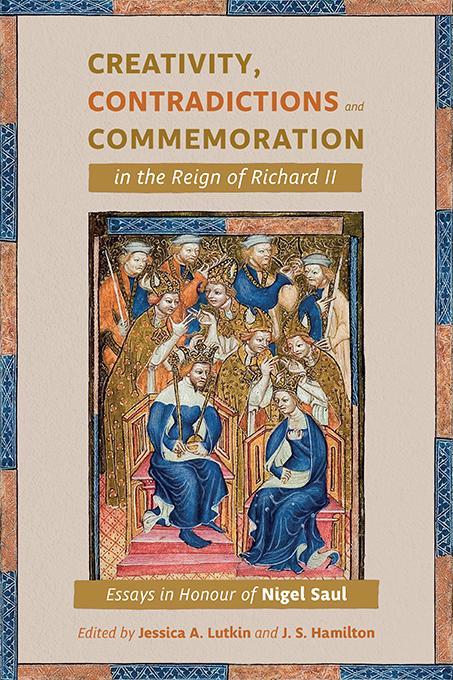 Creativity, Contradictions and Commemoration in the Reign of Richard II
Creativity, Contradictions and Commemoration in the Reign of Richard II 2 - ‘Defenders of truth’: Lord Cobham, John Gower, and the Political Crisis of 1387–88
Published online by Cambridge University Press: 26 May 2022
Summary
In 1387, Peter Mildenhall, skinner and citizen of London, was in deep trouble. A former alderman, he operated at the higher end of his trade, supplying furs and skins to the elite, including Lady Mohun, one of Richard II's favourites, who was running up an account with him as late as June 1387. In August, a writ was issued for his delivery to Nottingham castle, and he seemingly died there in 1388. The nature of the charge against him is evident in the pardon secured in 1391 by his son, William, also a prisoner, in which he acknowledged that he had not reported his father's treason in declaring that Richard was unfit to rule and should stay in a latrine, and that, with twelve men, he could take the king captive as he rode between Sheen and Westminster. Though the treasonous outburst is undated, the reference to Richard's movements suggests a date either in September 1386 or, if Mildenhall were still at liberty, in November 1387, both moments of high political tension. The allegation speaks to the increasing agitation and animosity in England, with a parliamentary crisis in late 1386, confrontation and recourse to arms in late 1387, and brutal reprisals in the Merciless Parliament in 1388. In the last months of 1387, London was a potential battleground. When Richard sought the city's support against the duke of Gloucester and the earls of Arundel and Warwick, the mayor found that most citizens refused to fight against the lords, whom they regarded as ‘friends of the king and kingdom’ and ‘the defenders of truth (ueritatis defensores)’.
Alarmed by hostility towards the court party in London, the king issued a proclamation forbidding, under pain of death, any speech or writing against him, the queen, or his friends. Even as the three magnates mobilised to defend themselves against the king's ‘false counsellors’, the earl of Northumberland advised Richard that the lords were his most faithful subjects and had the support of the populace, and Lord Basset declared that, though he was a loyal subject, if he had ‘to go into battle’, he would not fight for Robert de Vere, Richard's unpopular favourite, but would wish to hold ‘to the true side (partem ueracem) and the party of truth (ueritatis sectatricem)’.
- Type
- Chapter
- Information
- Creativity, Contradictions and Commemoration in the Reign of Richard IIEssays in Honour of Nigel Saul, pp. 35 - 52Publisher: Boydell & BrewerPrint publication year: 2022


